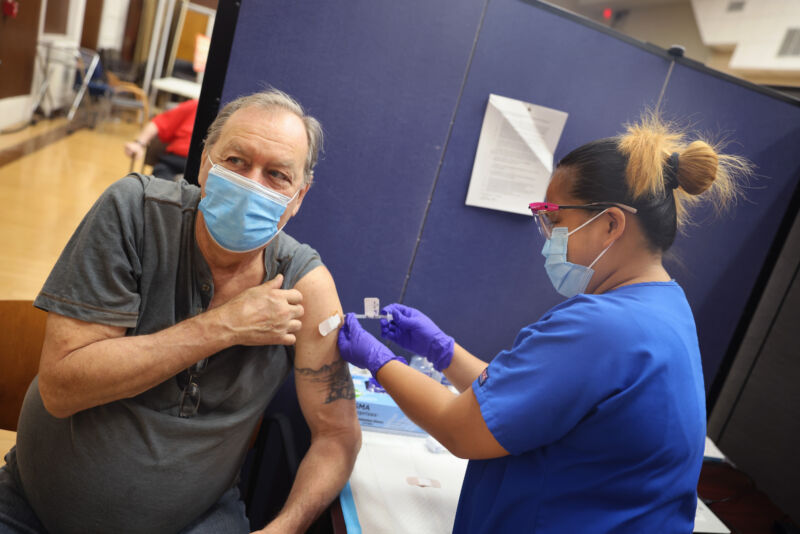
Over the past few weeks, federal health advisers pored over data on booster doses for Pfizer’s COVID-19 vaccine and agonized over setting recommendations for who—if anyone—should get a third shot. Amid their deliberations, they continually noted an undeniable truth overshadowed their hand-wringing: no matter what they recommended, boosters will have minimal impact on the pandemic. Instead, the way to end the scourge is to have more people get their first shots.
After all the debate, the director of the Centers for Disease Control and Prevention on Friday overruled the agency’s independent advisers. The director opened boosters to health workers and others with high exposure risks, in addition to the elderly and people with underlying medical conditions.
And today, new survey data suggests that offering any boosters may deter some unvaccinated from getting their first highly effective COVID-19 vaccine. A total of 71 percent of unvaccinated people said booster doses show the vaccines are not working as well as promised, according to the survey results published Tuesday by the Kaiser Family Foundation (KFF).
Boostless boosting
Splitting the unvaccinated further: of the unvaccinated who said they planned to “wait and see” before getting a shot, 69 percent said boosters show the vaccines are not working as well as promised. Of the unvaccinated who said they will “definitely not” get a shot, 82 percent said the same. By contrast, among people who are already vaccinated, 78 percent said the use of booster doses “shows that scientists are continuing to find ways to make vaccines more effective.”
The results will likely be bitter for experts who continue to be torn about the use of booster doses at this time. On one hand, protection from COVID-19 vaccination looks to be waning for some, particularly older adults. In others, a booster dose may reduce the risk of infection and transmission amid the delta surge. But that elevated protection may not last long, perhaps only a few months. Meanwhile, for most people, the primary series of two doses is still offering high levels of protection against severe disease and death—the main purpose of vaccination.
Even CDC director Rochelle Walensky, who expanded booster recommendations over the advice of experts, notes the minimal benefits. “I want to be clear,” she said in a White House press briefing last week, “we will not boost our way out of this pandemic. Infections among the unvaccinated continue to fuel this pandemic rise, resulting in a rising number of cases, hospitalizations, and deaths where people are unvaccinated.”
Additionally, many experts argue third vaccine doses used in the US would save more lives if they were used as first doses in low- and middle-income countries. Many lower-income countries have not been able to access vaccine supplies and protect even their frontline workers and most vulnerable.
Deaths and politics
Another potentially discouraging wrinkle in the survey is that fear and first-hand experience of suffering appear to be the biggest motivators for getting unvaccinated people to roll up their sleeves. Addressing only people who were vaccinated after June 1, the KFF survey found that 39 percent said a major reason for getting vaccinated was the rise of delta cases. Additionally, 38 percent said reports of local hospitals and intensive care units filling up was a major reason. And 36 percent reported that knowing someone who became seriously ill or died from COVID-19 was a major factor in getting vaccinated. When asked what the main factor was in their decision to get vaccinated, the most common reason—with 14 percent of respondents—was knowing someone who became seriously ill or died of COVID-19.
By June 1, there had already been 33 million cases of COVID-19 in the US, which had killed nearly 596,000 people. Since then, nearly 91,000 more people have died from COVID-19—deaths that were nearly all preventable with vaccines.
In addition to fear and suffering, vaccination mandates and requirements appeared somewhat helpful in getting people to get their shots. Among people recently vaccinated, 35 percent said vaccination requirements for participation in certain activities, such as going to the gym, a sporting event, or traveling, was a major factor in deciding to get vaccinated.
Among the currently unvaccinated, about 34 percent said that they would be very or somewhat likely to get a vaccine if their employer required shots. An additional 15 percent said they would be “not too likely” to get vaccinated for an employer requirement, while 50 percent responded “not at all likely.” If their employer offered an option to get weekly testing instead of a required vaccine, 56 percent of unvaccinated people say they would take the testing option.
Currently, roughly 75 percent of people eligible for vaccination (people ages 12 and up) are vaccinated with at least one dose. Nearly 65 percent are fully vaccinated. The groups with the lowest vaccination rates continue to be: uninsured people under age 65, Republicans, rural residents, White evangelical Christians, people ages 30 to 49, and adults without a college degree, according to the survey.
At this point, similar shares of Hispanic (73 percent), Black (70 percent), and White (71 percent) adults have received at least one dose. The largest remaining gap in vaccination rates is by partisanship, KFF notes, with 90 percent of Democrats reporting at least one dose compared with just 58 percent of Republicans and 68 percent of independents.
https://arstechnica.com/?p=1799029

